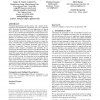Free Online Productivity Tools
i2Speak
i2Symbol
i2OCR
iTex2Img
iWeb2Print
iWeb2Shot
i2Type
iPdf2Split
iPdf2Merge
i2Bopomofo
i2Arabic
i2Style
i2Image
i2PDF
iLatex2Rtf
Sci2ools
145
click to vote
KBSE
2005
IEEE
2005
IEEE
Clearwater: extensible, flexible, modular code generation
Distributed applications typically interact with a number of heterogeneous and autonomous components that evolve independently. Methodical development of such applications can benefit from approaches based on domain-specific languages (DSLs). However, the evolution and customization of heterogeneous components introduces significant challenges to accommodating the syntax and semantics of a DSL in addition to the heterogeneous platforms on which they must run. In this paper, we address the challenge of implementing code generators for two such DSLs that are flexible (resilient to changes in generators or input formats), extensible (able to support multiple output targets and multiple input variants), and modular (generated code can be rewritten). Our approach, Clearwater, leverages XML and XSLT standards: XML supports extensibility and mutability for inprogress specification formats, and XSLT provides flexibility and extensibility for multiple target languages. Modularity arises from u...
Related Content
| Added | 25 Jun 2010 |
| Updated | 25 Jun 2010 |
| Type | Conference |
| Year | 2005 |
| Where | KBSE |
| Authors | Galen S. Swint, Calton Pu, Gueyoung Jung, Wenchang Yan, Younggyun Koh, Qinyi Wu, Charles Consel, Akhil Sahai, Koichi Moriyama |
Comments (0)

